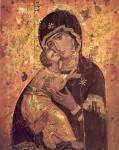SATURDAY of 13th WEEK, uneven numbered year
“Then John the Baptist’s disciples came to him and said, ’Why is it that we and the Pharisee’s fast, but your disciples do not?”
These words from Jesus are not easy ones to understand. He gives the response to John the Baptists’ disciples, who, in the desert, learned from their master ascetic values and the grace of renouncement ;they have an austere way of life and they fast. Jesus is not reproaching them! The question doesn’t’ take long coming out of their mouths : ’Why don’t your disciples fast whereas we and the Pharisees do fast?’
Jesus is the Bridegroom announced by the Prophets. He came to establish, in God’s name, a new and eternal Covenant with humanity. It is the time that the wedding feast is announced and revealed ; Jesus manifests his first sign by the miracle at the wedding feast of Cana. He shares with humanity his hope and Life.The Gospel manifests the confrontation between the Pharisees, John the Baptist’s disciples, and Jesus. The Pharisees, John the Baptist’s disciples believe that by their good works they will come to Salvation. They ask Jesus questions about sanctification. God’s Word is marvelous concert of Love that manifests the Infinite Love of God for his People.
“Jesus replied, ’Surely the bridegrooms’ attendants cannot mourn as long as the bridegroom is still with them? But the time will come when the bridegroom is taken away from them, and then they will fast.’”
The encounter of the living and true God is always an invitation to enter into his communion of his Love.A good number of parables of the Kingdom are parables about feasts. Jesus himself could often be found around a table, eating and drinking with everyone who came along. The Eucharistic table, a sign of this new and eternal Covenant, remains set each day at the heart of our lives. But Jesus goes on : a time will come when the Bridegroom will be taken away from them
and then they will fast. Christ the Bridegroom, whom mankind should have welcomed, will one day be arrested, taken away, hit and put on a cross. What desolation there will then be and, they will then indeed fast. Jesus opens wider the divine space from what was already announced in the first Covenant. He asks us to be at his school : ’Learn from me for I am gentle and humble of Heart.’ It is to be at the school of a sensitive heart, an opening up to weakness. Jesus experienced poverty by His coming in human flesh and the poor are the closest to Him!
“No one puts a piece of unshrinken cloth onto an old cloak, because the patch pulls away from the cloak and the tear gets worse. Nor do people put old wine into new wineskins; otherwise , the skins burst, the wine runs out, and the skins are lost; No; they put new wine in fresh skins and both are preserved.”
Here on earth we are tempted, we groan, overcome with sorrow ; we need to get rid of the od man, so as to gradually clothe ourselves with the new one, and to be renewed in the image of the Creator. This is the fast that is pleasing to God. The real holiness that rejoices his Heart is the real poverty allows him to clothe us again with Glory.The new wine is Christ’s, the true vine and cup of salvation, this new wine of His redemptive Blood poured out at his death, to give us back life. Jesus proposes to us that we enter into this new Love that is so different and goes as far as Eternal Life. He proposes to maintain us in the love of our relationship with God and with other people. It is the privileged place of poverty and vulnerability. Here we touch other people in the most precious and secret place of their life. It is God’s Life within us. There will be new relationships, much more gentle and humbler in which we are much more vulnerable, but where Love is King. For a new love, a new heart.

